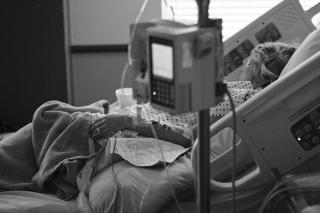Healthcare Is a Wild, Grief-Filled Ride Right Now


Healthcare is a wild, grief-filled ride right now.
As healthcare workers, we are caught in two opposing streams. Some of us (doctors, nurses, aides) are so “essential” that we cannot practice any distancing. We’re worried some for our own access to PPE (personal protective equipment) but mostly we’re worried about the patients we might not be able to help, especially if/when we escalate to an Italy type situation.
That is a traumatic experience.
We’re grieving already the care we know we won’t be able to give if it comes to that and despairing to see people sharing jokes and memes about how we are panicky idiots for encouraging social distancing. Can I ask something of you all?
Help us shut that down.
The second stream is all of us that are “non-essential” staff (like chaplains, social workers, all allied health therapists like OT, PT, SLP, MT) that cannot have access to many of our patients right now. We feel like we have been forced to abandon the most vulnerable people in our care right now, even as we fully support isolating them for their safety.
Hospice professionals are feeling that especially hard as our folks in nursing homes now have access only to their nurse and personal care aides. They will feel the effects of this isolation most profoundly and our hearts are heavy knowing we cannot be a part of the kind of good deaths we promised to provide for them and we will not get to say goodbye and honor the relationships we built with them. It’s heartbreaking and there’s not much we can do. But, rest assured that clever support staff are already brainstorming ways we can still get contact, spiritual support, emotional support, and music in to those patients.
Meanwhile, many of us “nonessential” healthcare staff across the country are also losing contracts and work hours right now and being asked to do tasks outside our job descriptions just to stay on payroll. I’m fortunate to be able to provide extra support for my community patients from inside my own role right now.
We’re grieving. Stopping or limiting the services we provide is traumatic. Working until we collapse because we can’t stop the services we provide is traumatic. Knowing or even fearing that those in our care will suffer consequences we cannot save them from is awful, and seeing flippant memes and people still attending events anyway is almost just as bad.
How can you help? Be aware of all of the above and let your congregants know that you are. My amazing DRE reached out to me last night to say they saw that this pandemic was bringing pain and harm to my professional life and I can’t tell you what that meant to have this grief upheld and acknowledged.
Make short connections and check-ins available to us if we’re the ones pulling endless days in the hospital and lower your expectations for our response. Keep reaching out anyway with it being clear you don’t expect our response.
Provide ancillary support for the healthcare workers who are so desperately needed on the front lines of this, like childcare, getting our groceries, or any other thing you can possibly think to take off our plates. I am very proud of my older brother for offering up the nonprofit he heads, our local science center (Discovery Center of Springfield) as contingency-plan childcare for all the healthcare workers in our local hospital systems in the event of school closures.
If we are the care providers who have been sidelined, help us find ways to be “essential” in pouring caring and creative energy into caring for the needs of our congregations.
Above all, make space for all of us to grieve, to worry, to rage, to do whatever and assure us you have room for us to do that, alongside all the folks who are impacted in other and different ways.
Be aware we are experiencing a disenfranchised grief and an unacknowledged trauma because nobody thinks about the doctor who lost 50 patients in a shift when they are thinking of the 50 patients who just died. Think of the patients. Think of their families. Then think of the doctors and nurses and aides and med techs and all the hospital staff and medical administrators, too.
Then let us know you did.